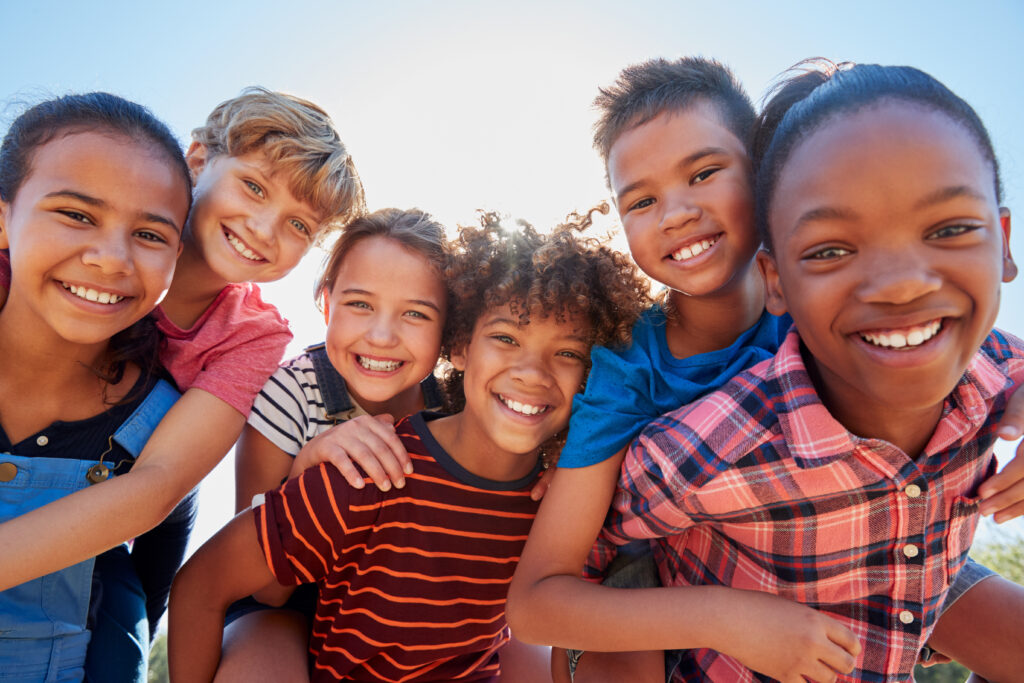COVID-19 vaccines have been available for children ages 5-11 since October 29, 2021. As of March 16, 2022, the Centers for Disease Control and Prevention (CDC) reports that just one-third (33%) of children in this age group have received their first vaccine dose, with vaccination rates varying widely by state. Just twenty-six percent of 5-11-year-olds have been fully vaccinated.
The ten states with the highest fully vaccinated rates among children ages 5-11 years (Vermont, Massachusetts, Rhode Island, Hawaii, Maine, Maryland, Connecticut, Virginia, Minnesota, and Illinois) have adopted creative approaches to promoting COVID-19 vaccination.
This blog highlights several of these approaches, which states may consider adopting when encouraging parents to get their children vaccinated against COVID-19 and other vaccine-preventable diseases. These strategies may be extended to vaccination activities for 6-month to 4-year-olds once COVID-19 vaccines receive emergency use authorization for this age group from the U.S. Food and Drug Administration.
Incentives
Many states have offered incentives to encourage COVID-19 vaccination. These incentives range from college scholarships to free food, with mixed results when evaluated for impact on vaccination uptake. A randomized clinical trial in Sweden in 2021 demonstrated that monetary incentives increased vaccination rates by approximately 4 percent. Other research has suggested incentives are most effective when three criteria are met: receipt of the incentive is certain, incentives are delivered immediately, and the recipients value the incentives. Several states in the top 10 for vaccine coverage offered incentives for vaccinating children ages 5-11, including:
- Vermont created the School Vaccine Incentive Program in December 2021, which provides monetary awards to schools achieving an 85 percent student vaccination rate. Schools are awarded $15 per vaccinated student with a minimum award of $2000 and a maximum award of $10,000. Schools achieving at least 90 percent student vaccination rate can apply for an additional 50 percent of the initial award, up to a maximum award of $15,000. The state is using federal emergency funds to support the program, which runs through April 1, 2022.
- Minnesota launched its Kids Deserve a Shot! campaign, providing families with a $200 Visa gift card if their 5-11-year-old child received both doses of a COVID-19 vaccine between January 1 and February 28, 2022. More than 22,000 children registered to receive a gift card as a result of this program. On March 1st, the Governor announced that any Minnesota parent or guardian whose 5 to 11-year-old had ever received both doses of COVID-19 vaccine by April 11, 2022, can enter to win one of five $100,000 Minnesota College Scholarships. This strategy was modeled after the state’s successful program to vaccinate children ages 12-17.
- Six months after 12-17-year-olds became eligible, the state launched the program to help drive up vaccination in the youth population, which had the lowest vaccination rate at the time. Within one week of the start of the campaign, first dose vaccinations increased nearly 40%. The state offered a $200 Visa gift card for 12-17-year-olds who started and completed their vaccine series within a six-week window, and five drawings of $100,000 Minnesota college scholarships for any Minnesotan 12-17 years old with a complete vaccine series.
School-located Vaccination Clinics
States play an important role in the success of school-based COVID-19 vaccination clinics. States can support schools with coordination of efforts, financial support, and media outreach in addition to providing vaccination supplies, personal protective equipment, and personnel to support these activities.
- Virginia recently published a playbook to support school-based vaccination events. Vaccination of the School-Age Population in a School Setting and in the Community: Playbook to Support Vaccination Events was created in partnership with the state’s immunization coalition, Vaccinate VA, and provides information for planning and conducting school-located COVID-19 vaccination clinics for the 5- to 11-year-old population.
- Connecticut published its #Vax2SchoolCT toolkit, which outlined step-by-step logistical considerations and recommendations for promotion and outreach. The toolkit provides a letter template for communications to students and families as well as information on the state’s Vaccine+ Program, which connects families to resources such as water and heating assistance.
- In Hawaii, schools were the main staging ground for administering COVID-19 vaccinations to children ages 5-11, with over 100 public, private, and charter schools holding vaccination clinics.
- Illinois organized 756 elementary school districts to offer vaccination clinics for students ages 5-11 on school grounds. Their mobile vaccination teams conducted more than 870 school and youth events when vaccines became available for 12-17-year-old students.
Parent-friendly Websites
States can provide public-facing information that is easy to access and navigate and that makes choosing to get vaccinated the easy choice. Several states have webpages dedicated to COVID-19 vaccinations for children.
- Vermont‘s dedicated website for pediatric COVID-19 vaccines, Just for Them!, provides an online consent form and pre-vaccination checklist translated in many languages. Twenty-five percent of Vermont’s 5-11-year-old population registered to receive a vaccine within eight hours of opening registration to the public.
- Minnesota posted their COVID-19 Vaccines and Kids: What Pediatricians Are Saying, video to the state’s website, providing information to parents who may be hesitant about getting their children vaccinated.
- Massachusetts has a dedicated website for COVID-19 vaccines for 5-11-year-old children that includes a downloadable consent form, answers to frequently asked questions, and includes a chatbot that can answer COVID-19 vaccine-related questions in real time.
Partnerships
States can partner with organizations such as their state chapter of the American Academy of Pediatrics, state and local immunization coalitions, and hospitals to help build confidence in COVID-19 vaccines and improve access to vaccination for children. For example:
- Vermont and the Vermont Chapter of the American Academy of Pediatrics partnered to provide Facebook live Chapter Family Forum events featuring Vermont pediatricians who discussed the importance of vaccinating children against COVID-19.
- Rhode Island and Lifespan’s Hasbro’s Children’s Hospital partnered to provide hospital-based COVID-19 vaccination clinics for children ages 5 to 11.
- Minnesota partnered with the Mall of America to vaccinate children. The Mall of America clinic had the capacity to vaccinate 1,500 children per day.
- Massachusetts partnered with museums such as the Discovery Museum in Action, Boston’s Museum of Science, and the EcoTarium Museum to offer age-specific vaccination clinics for younger children.
- Illinois announced that the Illinois Department of Public Health had reached out to every pediatrician in the state to enroll them in the vaccine distribution program and then called on parents to call their pediatricians and make sure they had enrolled and ordered doses. The state enrolled more than 2,200 locations to provide vaccinations to 5-11-year-olds, including more than 700 medical practices, more than 700 pharmacies, 100 urgent care centers, 112 local health departments and public health clinics, 270 federally qualified health centers, more than 200 hospitals, and dozens of rural health clinics.
Media
Federal funding has provided states with unprecedented opportunities to create media messages promoting COVID-19 vaccinations for children. States can play a vital role in building vaccine confidence and promoting vaccination for children through media. Examples of such messages include:
- Vermont partnered with Vermont Public Radio’s But Why: Podcast for Curious Kids to explain the importance of kids getting COVID-19 vaccines and hear from kids who took part in COVID-19 vaccine trials.
- Maine announced a contest for children ages 5 to 17 to create a short video that explains the benefits of getting the COVID-19 vaccine or the risk of not getting vaccinated. The first place winner was awarded $50,000 for their school, with $25,000 going to second place and $10,000 to third place. Schools can use the prize money to supplement school meals with healthy treats; purchase playground, classroom, gym, sports, or music equipment; enhance a special school activity; or support a school field trip for all students.
- Maryland partnered with the Maryland Chapter of the American Academy of Pediatrics to create a public service announcement featuring pediatric health care providers from around the state who encourage parents to get their children vaccinated against COVID-19.
- Illinois, in partnership with the Illinois Chapter of the American Academy of Pediatrics, created a COVID-19 Pediatric Vaccine Social Media Toolkit to provide credible, informative, and diverse social media messaging to promote COVID-19 vaccination for children ages 5 years and older. The toolkit included pediatric vaccination flyers, social media digital resources, and videos, including a video from the director of the Illinois Department of Public Health, Dr. Ngozi Ezike, who is a board-certified internist and pediatrician and the first Black woman appointed to lead the agency.
With FDA emergency use authorization of COVID-19 vaccines on the horizon for children ages 6 months to 4 years-old, states will need to continue to find new and innovative approaches to encourage parents to vaccinate their children and to ensure vaccinations are readily accessible.



